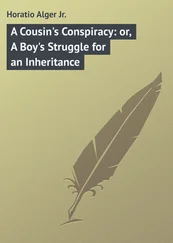Horatio Alger - Ben's Nugget; Or, A Boy's Search For Fortune
Здесь есть возможность читать онлайн «Horatio Alger - Ben's Nugget; Or, A Boy's Search For Fortune» — ознакомительный отрывок электронной книги совершенно бесплатно, а после прочтения отрывка купить полную версию. В некоторых случаях можно слушать аудио, скачать через торрент в формате fb2 и присутствует краткое содержание. Издательство: Иностранный паблик, Жанр: foreign_children, Юмористические книги, foreign_antique, foreign_prose, foreign_humor, на английском языке. Описание произведения, (предисловие) а так же отзывы посетителей доступны на портале библиотеки ЛибКат.
- Название:Ben's Nugget; Or, A Boy's Search For Fortune
- Автор:
- Издательство:Иностранный паблик
- Жанр:
- Год:неизвестен
- ISBN:нет данных
- Рейтинг книги:3 / 5. Голосов: 1
-
Избранное:Добавить в избранное
- Отзывы:
-
Ваша оценка:
- 60
- 1
- 2
- 3
- 4
- 5
Ben's Nugget; Or, A Boy's Search For Fortune: краткое содержание, описание и аннотация
Предлагаем к чтению аннотацию, описание, краткое содержание или предисловие (зависит от того, что написал сам автор книги «Ben's Nugget; Or, A Boy's Search For Fortune»). Если вы не нашли необходимую информацию о книге — напишите в комментариях, мы постараемся отыскать её.
Ben's Nugget; Or, A Boy's Search For Fortune — читать онлайн ознакомительный отрывок
Ниже представлен текст книги, разбитый по страницам. Система сохранения места последней прочитанной страницы, позволяет с удобством читать онлайн бесплатно книгу «Ben's Nugget; Or, A Boy's Search For Fortune», без необходимости каждый раз заново искать на чём Вы остановились. Поставьте закладку, и сможете в любой момент перейти на страницу, на которой закончили чтение.
Интервал:
Закладка:
"I should say so."
"Then we'll take the shortest way to the summit. I tell you, Tom, we're on the track of something rich. We'll take all this fellow's gold-dust, and he can't help himself. It'll be richer than any claim we've worked yet, if it pans out as well as I expect—eh, Tom?"
"I should say so, Bill," answered Hadley, with an expression of interest.
"I tell you, Tom," said Bill Mosely, complacently, "you were in luck when you fell in with me. We've done pretty well since we j'ined hosses, pard."
"I should say so—but," added Hadley, after a pause, "it would go hard with us if we got caught."
"We don't mean to get caught," said Mosely, promptly. "As for this new job, there's no danger in it. This man is down with a broken leg, and he can't help our taking his gold. The Chinaman's out of the way, and we've got a clear field. Take a good look, Tom, for your eyes are better than mine, and tell me if you see anything that looks like a cabin anywhere around?"
This inquiry was made some twenty minutes after they had left Ki Sing. They had pursued a circuitous course, or in half the time they might have been as near the cabin as they now were.
Tom Hadley didn't answer in his customary phrase, but instead raised himself erect on his mustang and looked sharply about him.
"Well?" demanded Mosely, impatiently.
"I don't see anything that looks like a cabin," said Hadley, deliberately, "but I think I see smoke."
"Where?" asked his companion in an eager tone.
"There," said Tom Hadley, pointing with his whip in a particular direction.
Mosely strained his eyes, but he was a trifle near-sighted and could see nothing.
"I can't see anything," he said, "but that proves nothing. If there's smoke, there's a house. There's no question about that, and there's not likely to be more than one cabin about here. Steer in the direction of the smoke, Tom, and I'll follow in your tracks. My horse is getting tired; he'll be glad to rest for the night."
"Will it be safe?" queried Hadley.
"Safe enough. The Chinaman is disposed of, and as for this broken-legged Dewey, we'll bind him fast and set him outside of the cabin while we make ourselves comfortable within. I shall be sorry to inconvenience him, but when a man has company he must expect to be put out—eh, Tom?"
"I should say so, Bill."
The two worthy gentlemen kept on their way till, making a sudden turn, the house, which had hitherto been concealed from them by a cliff, stood plainly revealed.
"There it is, Tom!" cried Mosely, joyfully. "We've found it, in spite of that lying heathen. It seems good to see a house after wandering about for weeks without a chance to sleep under a roof—eh, Tom?"
"I should say so, Bill."
It will be observed that Mr. William Mosely was fond of designating Ki Sing as a heathen, evidently appreciating his own superiority as a Christian. Yet I am inclined to think that a heathen like the Chinaman possessed more moral worth than a dozen Christians of the type of Mosely. From youth he had preyed upon the community, and his aim had been to get a living in any way that did not involve labor. Honesty was an obsolete word in his vocabulary, and a successful theft yielded him a satisfaction such as other men derive from the consciousness of well-doing. In fact, Mosely's moral nature was warped, and there was very little chance of his reformation.
Now that the cabin was near at hand, the two men did not quicken their speed, for the ascent was somewhat steep and their animals were tired.
"Take it easy, Tom. The whole thing's in our hands. Wonder whether Dewey's expectin' visitors?" he added, chuckling. "I say, Hadley, he'll be glad to see us—don't you think so?"
"I should say so," returned Hadley, before the joke dawned upon him.
"You see, we are going to relieve him of the care of that gold-dust of his. We're two bankers from 'Frisco, that's what we are, and we'll take care of all the gold-dust we can take in."
"I shall want my half," said Tom Hadley, unexpectedly deviating from his customary formula.
Mosely shrugged his shoulders. He did not quite like this new disposition of Hadley's to look after his own interests, but at present did not think it politic to say much about it. Though Tom Hadley had generally been subservient to him, he knew very well that if any difficulty should arise between them Tom would be a formidable antagonist. Fortunately for him, Hadley did not know his own power, or he would not have remained in subjection to a man whom he could have overcome had he been so disposed. He did not fully believe Bill Mosely's ridiculous boasts of his own prowess, but he was nevertheless disposed to overrate the man who made so many pretensions. All he asked was a fair share of the booty which the two together managed to secure, and this he had made up his mind to have.
They reached the cabin at last, and halted their horses before the door.
Both sprang off, and Bill Mosely, with a sign to his companion to remain in charge of them, entered at the open door.
"Is that you, Ki Sing?" asked Dewey, whose face was turned toward the wall.
Bill Mosely could not tell from the way he lay on the pallet, covered with a blanket, whether his leg were broken or not, but believed that this was the case. "That doesn't happen to be my name, stranger," he answered.
Richard Dewey turned suddenly on his low bed and fixed his eyes on the intruder. "Who are you? what do you want?" he demanded suspiciously.
"I thought I'd come round and make you a call, being in the neighborhood," answered Mosely, with a smile.
"Who are you?"
"Well, I'm not the President of the United States, nor I ain't Queen Victoria, as I know of," said Mosely.
"You look more like a horse-thief," said Richard Dewey, bluntly.
"Do you mean to insult me?" exclaimed Bill Mosely, fiercely. "Do you know who I am?"
Dewey was not easily frightened, and he answered coolly, "You haven't told me yet."
"Well, I'm Bill Mosely from the State of Missouri. I'm a regular tearer, I am. I don't take no back talk. When a man insults me I kill him."
"Very well. Now I know who you are," said Richard Dewey, calmly. "Now, what do you want?"
"How much gold-dust have you in this cabin? We may as well come to business."
"None at all."
"I know better. You can't pull wool over my eyes. Your Chinaman tells a different story."
"Ha! Have you seen Ki Sing?" asked Dewey, interested at last.
"Yes, I had the pleasure of meeting the heathen you refer to."
"Where is he now? Can you tell me?"
"To the best of my knowledge he is tied to a tree a mile or so from here. I don't think he will get away very easily."
"Scoundrel! you shall answer for this!" exclaimed Richard Dewey, springing to his feet, and thereby showing that neither of his legs was broken.
CHAPTER VI.
AN UNEQUAL CONTEST
Bill Mosely was decidedly startled when the man whom he thought helpless sprang up so suddenly and approached him in a menacing manner. He rose precipitately from the rude seat on which he had settled himself comfortably, his face wearing an expression of alarm.
Richard Dewey paused and confronted him. A frown was on his face, and he appeared very much in earnest in the question he next asked. "Have you dared to ill-treat my servant, you scoundrel?" he demanded.
"Look here, stranger," said Mosely, with a faint attempt at bluster, "you'd better take care what you say to me. I'm a bad man, I am."
"I don't doubt it," said Dewey, contemptuously.
This was not altogether satisfactory to Bill Mosely, though it expressed confidence in the truth of his statement.
"You haven't answered my question," continued Dewey. "What have you done with my servant?"
"Perhaps he wasn't your servant," said Bill Mosely, evasively.
Читать дальшеИнтервал:
Закладка:
Похожие книги на «Ben's Nugget; Or, A Boy's Search For Fortune»
Представляем Вашему вниманию похожие книги на «Ben's Nugget; Or, A Boy's Search For Fortune» списком для выбора. Мы отобрали схожую по названию и смыслу литературу в надежде предоставить читателям больше вариантов отыскать новые, интересные, ещё непрочитанные произведения.
Обсуждение, отзывы о книге «Ben's Nugget; Or, A Boy's Search For Fortune» и просто собственные мнения читателей. Оставьте ваши комментарии, напишите, что Вы думаете о произведении, его смысле или главных героях. Укажите что конкретно понравилось, а что нет, и почему Вы так считаете.












